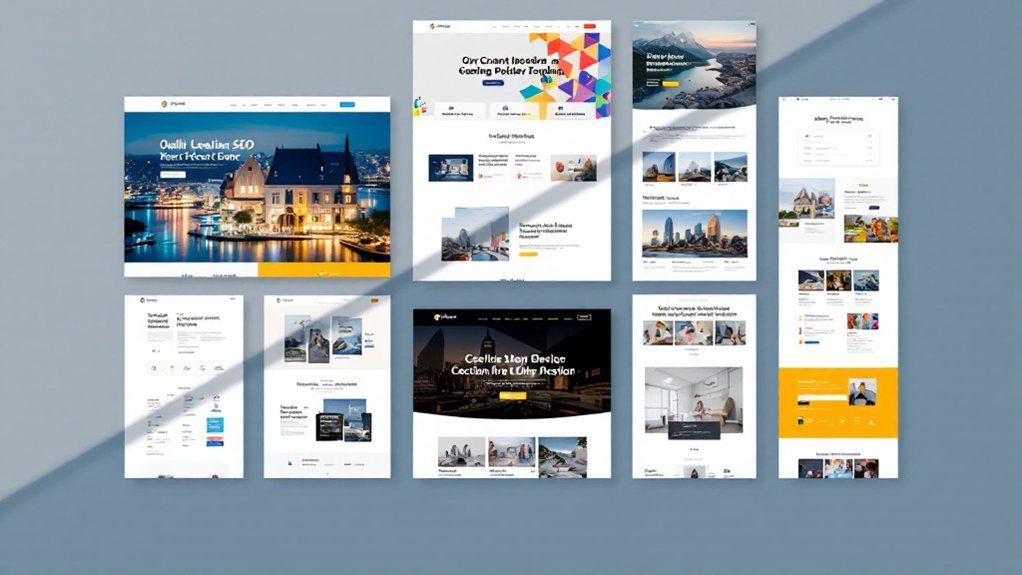To write unique city pages for multi-location SEO, you'll want to integrate local keywords, highlight location-specific offerings, and leverage testimonials and images. Organize your city pages with a clear website structure and optimize title tags, meta descriptions, and local business details. Incorporate relevant local content, like news and events, to build credibility and engagement. By following these strategies, you can create a strong online presence and connect with target audiences in each market. Discover more in-depth tips to enhance your multi-location SEO.
Key Strategy Elements for Unique City Pages

When creating unique city pages for multi-location SEO, you'll want to focus on several key strategy elements. Integrate local keywords naturally throughout the content to establish relevance. Include testimonials from local customers to build credibility. Highlight services or products unique to each location, and discuss relevant local events or news. Offer location-specific promotions or discounts to incentivize customers. Optimizing on-page SEO with geo-specific keywords in page titles and meta descriptions will also be crucial. Finally, prioritize local link building to drive authority and enhance user experience with engaging, location-focused content and structured data markup.
Organizing City Pages Within Website Structure

Organizing your city pages within a clear, hierarchical website structure is crucial for both user experience and search engine optimization. Create a main "Locations" page that directs users to specific city pages via dropdown menus or links. Integrate categories like "Areas Served" with each city as a subcategory. Use internal links within city pages to connect to relevant services or local news. Organize city pages with a parent "Locations" page and child pages for individual cities, using a consistent URL structure. This structured approach helps search engines crawl and index your content efficiently, while providing users with an intuitive navigation experience. Structured pages rank within 1 week, which is important for multi-location SEO.
Optimizing Title Tags and Meta Descriptions

Optimizing your title tags and meta descriptions is crucial for multi-location SEO, as they directly impact how your webpages appear in search engine results. Keep your title tags concise, between 55-65 characters, and include relevant keywords, location, and your brand name. Consistent branding across title tags and meta descriptions is important to establish the business identity. Use action-oriented language to boost click-through rates. For meta descriptions, aim for around 150-170 characters and include a clear, compelling summary of the page's content. Incorporate location-specific details and keywords to enhance local SEO. Test different formats and monitor user engagement to refine your approach. By optimizing these elements, you can improve your visibility and drive more qualified traffic to your city-specific pages.
Incorporating Local Images and Videos
Incorporating local images and videos into your city pages can significantly enhance their appeal. By showcasing recognizable landmarks or cultural elements, you'll create a stronger connection with your target audience. Additionally, well-crafted videos can boost engagement and improve your site's visibility in search results. Videos are clicked twice as much as images, which can lead to higher engagement from your target audience.
Optimize Location-Specific Visuals
When it comes to optimizing location-specific visuals, you'll want to start by incorporating eye-catching images that truly capture the essence of your local market. This includes:
- Showcasing your business's exterior and interior to build brand recognition.
- Highlighting local landmarks or cityscape shots to make your content more relatable.
- Featuring your team and staff to add a personal touch.
- Incorporating local videos to provide a dynamic and engaging experience for your audience.
Ensure you optimize your image file names and alt text with relevant local keywords for improved SEO. By creating a visually engaging and localized experience, you'll effectively connect with your target audience and boost your search engine visibility.
Enhance Page Engagement With Videos
Enhancing page engagement through the strategic use of videos can significantly boost your local SEO efforts. By embedding relevant videos on your geo-specific pages, you can increase user dwell time, a crucial metric for Google. Optimize your videos for search engines by incorporating local keywords and using schema markup to provide detailed information. Create unique, value-adding video content that resonates with your target audience. Regularly analyze video performance using analytics tools to refine your strategy. Leverage video in your Google My Business profile to showcase your local expertise. Captivating thumbnails and genuine customer testimonials further enhance video engagement and build trust. [Leveraging the power of videos can elevate your city pages and drive meaningful interactions with your local audience.
Align Imagery With Local Content
While incorporating local imagery into your city pages can significantly enhance their relevance and appeal, it's crucial to ensure the images are closely aligned with the content and topics being discussed. To achieve this, consider the following best practices:
- Prioritize high-quality, location-specific thumbnails that capture recognizable landmarks or features to grab users' attention.
- Incorporate images that reflect local cultural nuances and preferences to create a personalized experience.
- Leverage structured data to provide additional context for images, enhancing their visibility in search results.
- Optimized images can contribute to improved website performance and engagement.
Ensuring Consistent NAP Details
Ensuring your NAP (name, address, and phone number) listings are consistent across platforms is crucial for multi-location SEO. Maintaining consistent NAP can boost your search rankings and build trust with both search engines and customers. Take the time to verify your location details are accurate and uniform on your website, Google Business Profile, and other local directories. Consistent NAP information helps search engines accurately identify and index your business locations.
Consistent NAP Listings
Consistent and accurate Name, Address, and Phone number (NAP) listings are crucial for multi-location businesses to maintain credibility and improve their online visibility. Consistent NAP data ensures search engines accurately index your business information, leading to better search rankings and a positive user experience. To maintain NAP consistency:
- Regularly audit your listings and promptly update any changes across all directories.
- Prominently display accurate NAP information on your website and social media profiles.
- Utilize tools to monitor and manage your NAP listings, ensuring they remain consistent and up-to-date.
Consistent NAP is a fundamental element of effective multi-location SEO, helping you build trust with both search engines and customers.
Verifying Location Details
Verifying the details of your business locations is crucial for boosting local search visibility. Accurate representation on your Google Business Profile ensures customers find you. Verifying business location on Google is crucial for visibility and credibility. Utilize mail, phone, email, or instant verification methods to confirm your details. Maintaining consistent NAP (name, address, phone) across online platforms builds credibility. Dedicate a unique Google Map to each location page, reinforcing your local presence. Verification legitimizes your physical locations, enhancing trust. Incorporate geo-specific keywords and content to optimize for local SEO. A structured URL structure aids indexing of your location-specific pages. Prioritize this verification process to improve search rankings and connect with your target audiences.
Developing Location-Specific Content
Crafting location-specific content is crucial for effectively reaching your target audience. To develop compelling city pages, consider these strategies:
- Highlight local culture and community. Showcase unique aspects of the area, such as popular attractions, events, or local specialties, to help users connect with your business.
- Address hyper-local pain points. Identify specific challenges or needs faced by your customers in that region and create content that provides valuable solutions.
- Optimize for location-based keywords. Naturally incorporate relevant city, state, or regional terms throughout your copy to improve search visibility.
Featuring Local Interviews and Team Photos
By incorporating local interviews and team photos into your city pages, you can create a more authentic and personalized experience for your target audience. Use local interviews to showcase unique insights from your company or service, featuring diverse perspectives from employees to enhance authenticity. Publish these interviews on city pages to add unique content for SEO. Showcase team photos of staff at specific locations to personalize your service, and include images of local team members participating in community events. Utilize visual storytelling to build trust and credibility with local audiences, optimizing your content for better search engine visibility.
Highlighting Relevant Local News and Events
Incorporating relevant local news and events into your city pages can significantly enhance your business's connection to the community. Not only does it showcase your involvement and investment in the local area, but it can also boost your SEO by demonstrating your authority and relevance. Here are three key benefits of highlighting local news and events:
- Event Promotion: Showcasing upcoming local events can attract visitors seeking activities in the area.
- Community Engagement: Supporting local events expresses your community pride and involvement.
- Unique Content: Each city page should feature distinct local news to avoid duplication and offer truly unique experiences.
Leveraging Customer Testimonials From Locations
One of the most powerful ways to bolster the local credibility of your city pages is by incorporating customer testimonials from each location. Testimonials showcase real experiences and build trust, which is essential for local SEO. When tailored to each city, they help differentiate your locations and provide social proof for potential customers. Regularly updating your testimonials maintains fresh content, improving user engagement and SEO rankings. Combine testimonials with other local content like photos, videos, and community ties to create unique, mobile-friendly pages that validate your business quality and customer service. Leveraging these local testimonials can be a game-changer for your multi-location SEO strategy.
Conducting Regular SEO Performance Monitoring
Regular SEO performance monitoring is crucial for the success of your multi-location marketing strategy. Leverage tools like Google Search Console, Google Analytics, and Ahrefs to track key metrics such as organic traffic, keyword rankings, and page speed. Use this data to:
- Identify underperforming location pages and refine your content strategies.
- Enhance technical aspects to improve user experience and engagement.
- Refine your local SEO campaigns, including location-specific keywords and Google My Business optimizations.
Regularly review SEO reports, set up automated alerts, and analyze competitor data to make informed, data-driven decisions that drive sustainable growth across your multi-location business.
